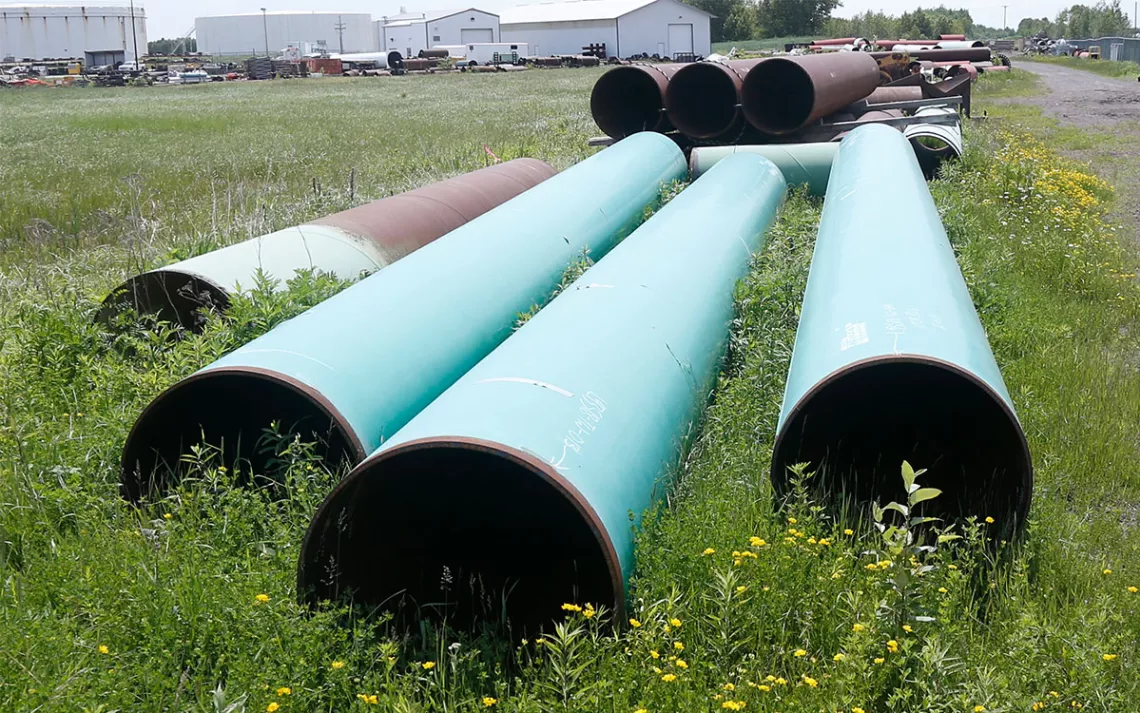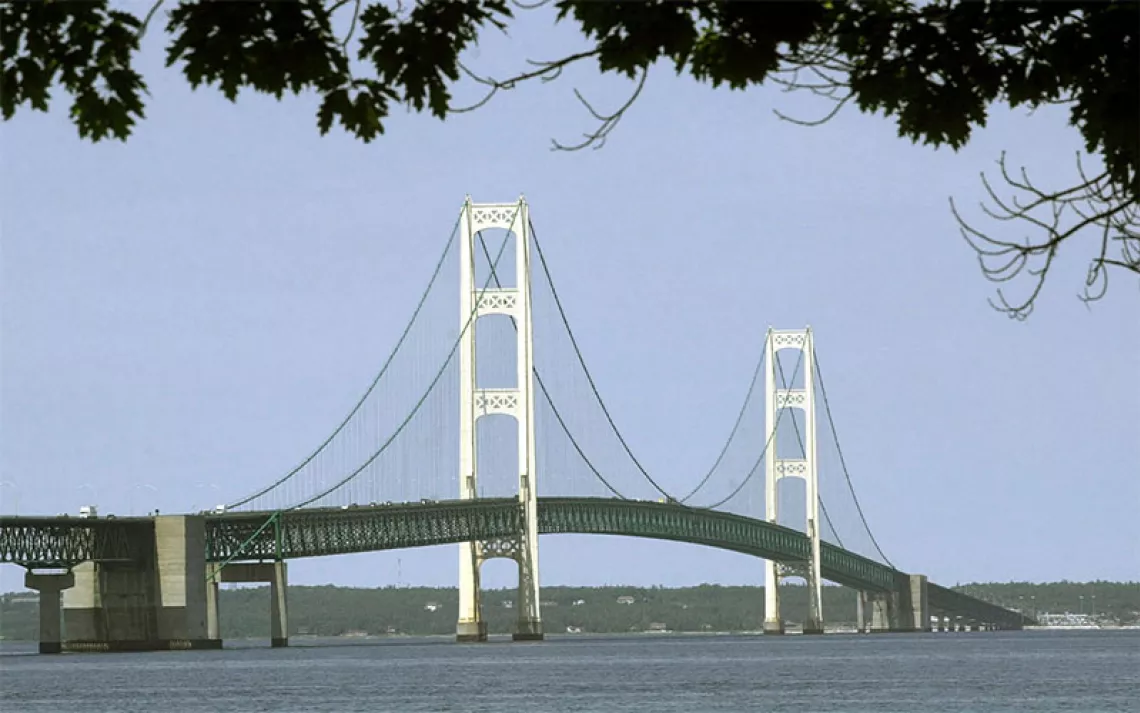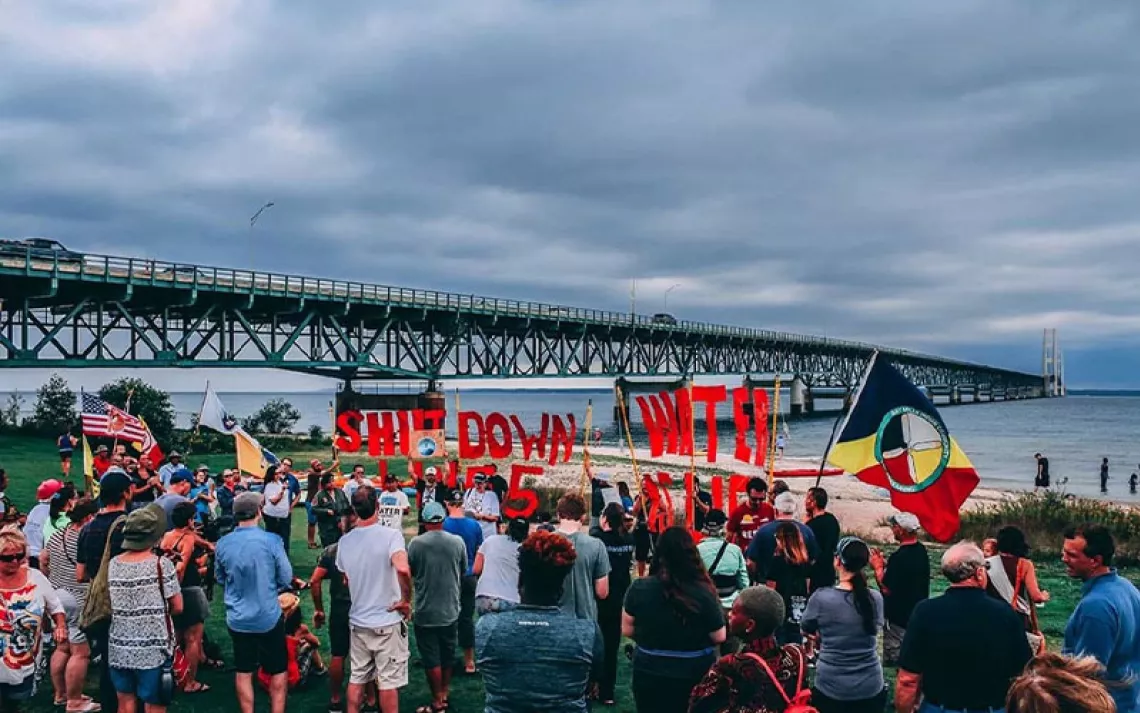America’s Most Dangerous Pipeline Lives Another Day
Enbridge keeps a time bomb ticking beneath the waters of the Great Lakes

A pipeline used to carry crude oil sits at the Superior, Wisconsin, terminal of Enbridge Energy. | Photo by Jim Mone/File
A broad coalition of environmentalists and Native Americans suffered a setback in early December in their effort to shut down Line 5: an aging pipeline, owned by Canadian giant Enbridge, that transports tar sands oil across tribal lands and underneath the Great Lakes in Wisconsin and Michigan. The Michigan Public Service Commission (MPSC), an energy and communications technology panel appointed by the governor, endorsed Enbridge’s proposal to build a tunnel for a four-mile stretch of the pipeline beneath the Straits of Mackinac, near the junction of Lake Michigan and Lake Huron.
Enbridge has spent years leveraging legal loopholes and inaction on the part of the Biden administration to continue transporting 540,000 barrels of oil per day on Line 5—from Alberta through northern Wisconsin and back to refineries in Sarnia, Ontario—without a valid easement from the state of Michigan. Its operations also defy a ruling from a federal judge in Wisconsin that the pipeline trespasses on tribal lands. The MPSC decision stipulates the completion of an environmental impact statement by the US Army Corps of Engineers, which isn’t anticipated until 2026.
MPSC acknowledged that an oil spill in the Great Lakes would be “catastrophic” in its decision, reaffirming University of Michigan research that has modeled how oil from an underwater pipeline rupture could disperse in currents and contaminate over 700 miles of shoreline. Under the plan, a drilled tunnel and new pipeline would replace about four miles of 70-year-old twin pipelines, which were originally built with a 50-year life expectancy, running across the lakebed.
Sean McBrearty, the Michigan state director of Clean Water Action, a nonprofit that’s part of a coalition of environmental organizations and tribal communities, including the Sierra Club, is disappointed the agency discounted the option of shutting down the pipeline altogether. He said the panel ignored supply chain alternatives already in place that could accommodate Line 5 products—let alone the climate implications of investing in new pipeline infrastructure rather than prioritizing actions to rapidly phase out fossil fuels. “Enbridge is fighting an existential battle with Line 5,” McBrearty said.
For decades, the company has failed to comply with the maintenance and operation standards of Line 5 set in place as part of its easement with the state of Michigan. Meanwhile, Enbridge has poured millions into advertisement campaigns that play up fears around propane shortages and increased gas prices in Michigan, as well as lobbying the Canadian government to threaten the White House with an obscure binational hydrocarbon treaty on the corporation’s behalf. An October 2023 study by PLG, an energy supply chain and logistics consultant, contradicts the company's claims. It concluded that “there is a range of commercially viable and operationally feasible supply chain alternatives for each of the end use destinations and markets that would be affected by a Line 5 shutdown,” including Enbridge’s underutilized Line 78 and oil tankers.
Enbridge has managed to defy Michigan governor Gretchen Whitmer’s eviction notice for more than two years through legal delays and appeals. “It would be the first time a pipeline is shut down by state action before a major rupture occurs,” McBrearty said. “For the oil industry as a whole, and Enbridge as North America’s largest pipeline company, they do not want to set a new precedent with a pipeline being shut down to protect the environment.”
“Enbridge continues to make money when there’s a delay,” added David Gover, a staff attorney with the Native American Rights Fund, which is representing Bay Mills Indian Community, one of over 60 tribal nations fighting for a Line 5 shutdown. “If they get the tunnel, that's more infrastructure and more long-term profit for them as well. They’re in a good spot for making money.”
Last spring, the United Nations Permanent Forum on Indigenous Issues urged the decommissioning of Line 5, arguing that it presents “a real and credible threat to the treaty-protected fishing rights of Indigenous Peoples in the United States and Canada.” Tribes were not consulted in 1953 when Enbridge stretched the pipeline beneath the Straits of Mackinac, a sacred place for Indigenous Anishinaabe people. This expanse of fresh water “is where Turtle Island was created,” said Gover (the tribal name for nearby Mackinac Island is “place of the great turtle”). “It is central to their spiritual and cultural beliefs and practices.”
The 1836 treaty signed by local tribes, including Bay Mills, “guarantees the preservation of the inherent rights of Native Americans to fish, gather, and use these places,” Gover explains. “Treaties are still in existence. They’re living documents and should be continued to be honored. They still apply as the highest law of the land, written into the US Constitution itself.”
Enbridge is also leveraging the legal system to work around a federal trespass conviction where Line 5 crosses the Bad River Band of Lake Superior Chippewa reservation in northern Wisconsin. Here, the tribe chose not to renew an easement that expired in 2013 allowing the pipeline to pass through its reservation because of concerns around erosion and the consequences of a spill. Last year, a federal judge in Wisconsin gave the company three years to reroute Line 5. Enbridge challenged the ruling, and a decision is expected from the US Seventh Circuit Court of Appeals in February.
Enbridge is clearly “using the legal process to shop around for a friendly jurisdiction instead of playing by the rules,” McBrearty said. Along with the Bad River appeal, Enbridge is challenging Michigan Attorney General Dana Nessel’s shutdown lawsuit in the Sixth Circuit Court of Appeals. With the MPSC endorsement of the Mackinac tunnel, McBrearty said, grassroots efforts must focus on informing the Army Corps that building more pipeline infrastructure is a bad idea, as well as using the 2024 election to target decision-makers in the White House. So far, McBrearty said, the Biden administration has been disappointingly silent on Line 5, despite its promises to wean America off its dependence on fossil fuels and foster better relations with tribal communities.
“Line 5 is an election issue that really said something about candidates’ understanding of the climate crisis,” McBrearty said. “If you agree with the IPCC reports, then you know we must transition away from fossil fuels as quickly as possible. It makes no sense to be operating a pipeline under 20 percent of the world’s fresh surface water, much less opening a new tunnel to transport oil in the 2030s.”
 The Magazine of The Sierra Club
The Magazine of The Sierra Club







